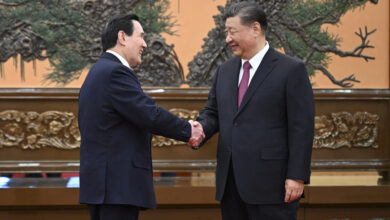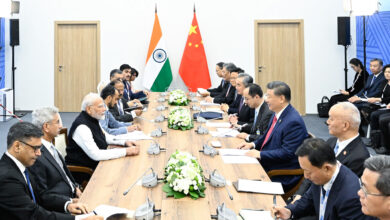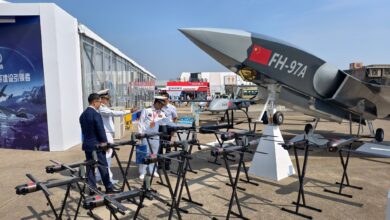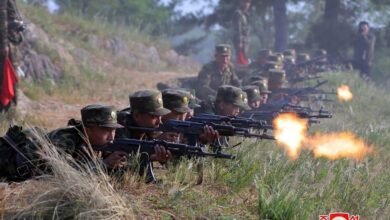
As the national flower of Korea, known as the Rose of Sharon, returns to the Korean Peninsula, the world is transfixed by the stunning diplomatic developments between North and South Korea, and the upcoming summit between President Donald Trump and Kim Jong-un. The Kim regime continues its all-out charm offensive, combined with stunning promises of denuclearization, raising the hopes of even some considered hawkish in the Trump administration. Rumors of the Nobel Peace Prize swirl in the midst of the Korean spring thaw.
But are things as they seem?
There are but two possibilities, soon to be unveiled to the watching world. Kim Jong-un is sincere, or he is not. If Kim is genuine in his conciliatory overtures, why? What changed between the belligerence of last year’s draconian threats and this year’s olive branch? The Trump administration is understandably taking credit for this apparent reversal, but it seems unlikely sanctions finally became excessively onerous after so many previous iterations, and the North denies this is the case.
‘The Korean miracle’
The Trump administration deserves credit for increasing pressure on the Kim regime, but even that increased pressure is not without dissent from other members of the U.N. Security Council. It may be that Kim prefers a legacy as the hero who reunited Korea rather than a villainous dictator with an uncertain end. If this is true, the process must move forward as Kim attempts, for whatever reason, to legitimize and modernize North Korea. If so, this would qualify as the Korean miracle some propose it to be, although others are not so sure.

The Kim regime, however, is not the only stakeholder, and it is a grave mistake to consider Kim’s overtures without considering the broader strategic situation in Asia. What about China? What Middle Kingdom interest changed in the last couple of decades when they viewed their southern neighbor as a belligerent but welcome buffer between the Yalu River and the American-friendly South Koreans?
One must consider if a denuclearized, and possibly even united, Korean Peninsula is in their interest. If so, why did China not move sooner, and more overtly to pressure North Korea? At the end of last year, they were viewed as the most likely candidate to resolve the Korean crisis, but failed to act and resisted U.N. sanctions. Their move to suddenly support the endgame those sanctions were designed to effect is questionable.
If Kim is sincere, there remains the problem of the other Pyongyang elites. Do they all support handing over the nuclear “keys of the hermit kingdom” which were gained at such cost and peril to the regime? This might be the case if Kim was successful enough in his pre-Olympic purge of the last several years to have a free hand in dealing with the outside world.
But why would Kim assassinate his half-brother, Kim Jong-nam, only to turn around and immediately embrace the West? Would his brother be alive if the Korean Olympics were just a year earlier? Everything about the last 70 years of the Kim dynasty makes that possibility hard to believe. There is broad consensus he was ruthlessly effective in consolidating his power, to think he is ready to walk away from all that effort is naïve.
A dangerous game
And what if Kim is not sincere? If so, Kim is maneuvering to continue his nuclear weapons program and neuter international support for military action aimed at ending the North Korean nuclear threat. Perhaps Kim is buying time until the 2020 U.S. presidential elections, hoping for a less-hawkish administration. Or, as argued by Van Jackson in Politico, his goal may be to give Trump a win by sacrificing his ICBM capability but retaining his nuclear capability to threaten Asian neighbors.
This would drive a wedge between the U.S. and its partners in Asia. Perhaps the murder of his brother, calculated embrace of South Korea, and overtures to the West are part of a larger plan aimed at long-term goals to consolidate his power and isolate the U.S.
Sun Tzu famously suggests defeating an enemy before they even know they are at war; it may be Kim is attempting to do just that.
Would Kim be audacious enough to attempt such a diplomatic ruse on his own? It is doubtful; his position is not strong enough. He would likely need to be sponsored by China or Russia. This would mirror the history of the original Korean War and explain his sudden change of heart early this year.
It is possible Kim, sponsored by old allies, is playing a game of ego manipulation with a South Korean president elected on a conciliatory platform, and a U.S. president who touts his ability to close good deals. Kim’s first diplomatic train stop was Beijing, followed up more recently by his first international diplomatic flight. This is a scenario that should not go unconsidered.

The recent audacious Chinese buy off of the Dominican Republic to further isolate Taiwan is yet another indicator of the expansionist lengths China will go within Asia. China is sure to be uncomfortable with any arrangement that includes the continued long-term presence of U.S. military members in South Korea. Kim has a shared interest in this outcome and is surely maneuvering toward that goal. Rumors of U.S. force reductions are already swirling, although the Trump administration denies them.
Just war, just peace
The ongoing diplomatic process is, for now, a worthy example of Just Peacemaking Theory (JPT). JPT originated in the work of the recently deceased Dr. Glen Stassen at Fuller Seminary. It is an approach to international conflict which argues first for preemptive initiatives to reduce international and civil tensions while moving nations toward justice, reconciliation, and peace. It adds a third paradigm to pacifism and Just War Tradition (JWT) approaches to war ethics.
JPT is best viewed conjointly with JWT: it does not replace JWT but is complementary because it advocates advanced diplomatic alternatives, but also acknowledges the need for military action after all other options fail.
To be clear, JPT is in its infancy as a theoretical construct and has notable shortcomings. As Lisa Cahill rightly points out, JPT does not currently provide an ethical endorsement of coercion, an unrealistic oversight in international conflict management. But the basic JPT concept remains; peace is a most worthy pursuit but must bring with it justice from conception to consummation. Extensive historical autopsy of the failed Treaty of Versailles shows what happens when a negotiated peace is not just.
Western arts and literature love the redemptive “villain turned hero” story, and there is considerable hope this is what is unfolding during this Korean spring. To be sure, there are almost daily news reports of positive steps toward reconciliation. These steps and the ongoing meetings between stakeholders bring hope peace will advance.
This is a unique chance, perhaps the last chance, to move forward toward the reconciliation and peace both Kim and Moon say they desire. But this path requires great caution and wisdom, and as many have already pointed out, it is fraught with risk.
There are many unresolved questions about motivation and intentions on the part of North Korea. Resolving these questions and navigating the uncertain road ahead requires a “whole of government” approach founded in the professionalism of members of the inter-agency teams who comprise the backbone of U.S. defense and diplomacy. Especially the U.S. Department of Defense and the U.S. State Department, but other agencies should be ready for whatever may emerge out of the next few critical weeks, be it conflict or the blooming of a peaceful and just Rose of Sharon across all of Korea.
 Colonel David Murphy retired in November 2014 after 25 years of U.S. Air Force service and is currently working on a PhD from Dallas Baptist University. Colonel Murphy served in a variety of operational, support, and training assignments culminating as the 782nd Training Group Commander at Sheppard Air Force Base. A graduate of the U.S. Army War College Class of 2012, Colonel Murphy has 12 years of experience in the Pacific Air Forces including four years in Korea.
Colonel David Murphy retired in November 2014 after 25 years of U.S. Air Force service and is currently working on a PhD from Dallas Baptist University. Colonel Murphy served in a variety of operational, support, and training assignments culminating as the 782nd Training Group Commander at Sheppard Air Force Base. A graduate of the U.S. Army War College Class of 2012, Colonel Murphy has 12 years of experience in the Pacific Air Forces including four years in Korea.
Follow him on LinkedIn.
All views and opinions expressed in this article are those of the author, and do not necessarily reflect the opinions or positions of The Defense Post.
The Defense Post aims to publish a wide range of high-quality opinion and analysis from a diverse array of people – do you want to send us yours? Click here to submit an Op-Ed.











